UNDERGRADUATE RESEARCH BLOGS
The Office of Undergraduate Research sponsors a number of grant programs, including the Circumnavigator Club Foundation’s Around-the-World Study Grant and the Undergraduate Research Grant. Some of the students on these grants end up traveling and having a variety of amazing experiences. We wanted to give some of them the opportunity to share these experiences with the broader public. It is our hope that this opportunity to blog will deepen the experiences for these students by giving them a forum for reflection; we also hope these blogs can help open the eyes of others to those reflections/experiences as well. Through these blogs, perhaps we all can enjoy the ride as much as they will.
EXPLORE THE BLOGS
- Linguistic Sketchbook
- Birth Control Bans to Contraceptive Care
- A Global Song: Chris LaMountain’s Circumnavigator’s Blog
- Alex Robins’ 2006 Circumnavigator’s Blog
- American Sexual Assault in a Global Context
- Beyond Pro-GMO and Anti-GMO
- Chris Ahern’s 2007 Circumnavigator’s Blog
- Digital Citizen
- From Local Farms to Urban Tables
- Harris Sockel’s Circumnavigator’s Blog 2008
- Kimani Isaac: Adventures Abroad and At Home
- Sarah Rose Graber’s 2004 Circumnavigator’s Blog
- The El Sistema Expedition
- The World is a Book: A Page in Rwand
Victoria
Victoria Grisanti
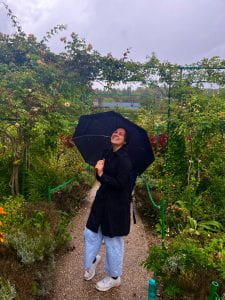
What language did you study and why?
I studied Swahili because I was interested in working in East Africa as a doctor one day. I firmly believe that learning the local language is the most important step one can take to provide ethical care when participating in international public health.
What program did you attend and why did you choose it?
I attended Howard University’s Swahili program because they have strong ties to the exchange university (Daystar University in Nairobi) and because the program values cultural exchange and immersion. I also had the chance to attend Pwani University on the coast of the Indian ocean which was incredible!
Describe your experience doing summer language study. Was it tricky? How do you think your language skills improved?
It was really difficult to start out because I was a complete beginner. All of the other students were significantly more advanced than me and I was so nervous. The learning curve was step but being surrounded by more advanced students actually helped me learn quickly! My Swahili went from complete beginner to high intermediate in only 6 weeks and I wish I could have spent more time learning in the immersive setting. I was able to haggle prices, joke with my Kenyan friends, and even give a 10 minute presentation by the end of my course.
Did intensive summer language study change or solidify any of your future goals? If so, how?
Studying in Kenya helped me realize that I am actually more interested in working within the US to help recent East African immigrants, rather than moving abroad myself. There is a significant lack of health professionals who can speak this language, despite the fact that 150 million people in East Africa speak it. Hearing how many of my Kenyan friends at my exchange university want to move to the US made me realize how necessary it is for people in the US to learn Swahili, especially in the medical field. Working within immigration in the US is a new goal that emerged from my time and experience in Kenya.
Do you have any tips or advice for students similar to you that are interested in pursing intensive language study?
Do not give up! It may seem overwhelming at first but it is an incredible opportunity. Learning intensively is so rewarding because you can see your growth, it happens so quickly!
What’s the most interesting thing you’ve learned/read about/listened to this week?
Harry Potter in french! I am living in Paris at the moment and reading Harry Potter in french, and the word for magic wand is “baguette magique” (not even kidding).
What is your most useless talent?
The slide whistle
Danielle
Danielle Llevada
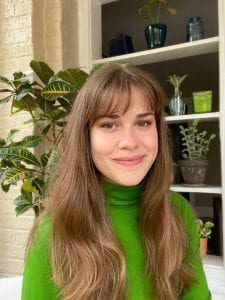
Please provide a brief summary of your research.
How can navigating depression, though personally nuanced, be reframed through a whimsical dramedy series to make viewers feel less isolated and contribute to the de-stigmatization of mental health on screen? Over the summer, I investigated the ways in which depression, anxiety, and grief interact with our daily lives and relationships, and how these experiences can be depicted on TV in a way that promotes a sense of community and healing. The purpose of my research was to aid the development of my own TV series, Equanimitea: a dramedy in which a pair of siblings are tasked with unpacking the mess and mystery of their mother’s disappearance. While running their mother’s tea shop, they discover a discrete syrup she created to help patrons become temporarily invisible. Over the course of my grant period, I explored literature on emotional connection and mental health, analyzed the story telling techniques of various TV comedies, and spoke with mental health professionals who advised the development of my story and characters. While utilizing these resources to write the pilot episode of my series, I began to unravel my own thoughts on what it means to make yourself invisible/seen and what I would like my work to contribute to the ever evolving conversation of mental health on screen.
What made you initially interested in researching your project in particular?
During the school year I began developing my TV series as part of the inaugural cohort of the Pritzker Pucker Studio Lab for the Promotion of Mental Health via Cinematic Arts. Wanting to create something meaningful and conscientious, I sought out additional time and opportunities to further the research and development of my series. I felt that beyond my own experiences with depression there was a lot more to learn about how those feelings might manifest in people of different backgrounds and personalities. Additionally, I was interested in how they live with in the dynamic of a dysfunctional family where addiction and feelings of grief and anxiety are also part of the mix. I also wondered how comedy might play a role in all of that. There were many layers of my project that needed further exploration.
What made you interested in pursuing (interdisciplinary) research more broadly?
Media, particularly film and television, has a huge impact on our perception and our understanding of the world we live in. When it comes to mental health, I feel there is an intrinsic responsibility that creators have to build something that is not only compelling, but also accurate and thoughtful. To do this, it is essential to dive into a realm in which you are not an expert and seek out the guidance of those who are. For me, that was finding the connections between psychology, mental health and screenwriting.
Describe your experiences with research thus far. Was it tricky? What skills do you think you’ve gained?
The trickiest part of my research was figuring out what questions to ask and setting goals that were realistic and attainable. This summer, I learned a lot about my creative process as a writer. Initially, I felt overwhelmed by the massive ideas and expectations I had set and I found myself having to slow down and pick apart my thoughts little by little. Though I was impatient at times, I learned that it is okay to share pieces of my work that are still in progress. Often times seeking the input of others (some who perhaps have nothing to do with your field) or just simply thinking out loud helped me dissolve some of my mental road blocks while writing.
Any tips or advice you have for students similar to you that are interested in pursuing undergraduate research?
Just go for it! You’d be surprised how far one thought or question can take you. Don’t worry if your research takes you somewhere different from what you initially proposed. It can often be more exciting when you end up learning or creating something unexpected.
John
John Chen
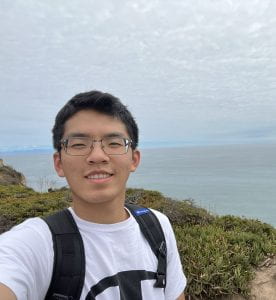
Please provide a brief summary of your research.
Broadly, my research focuses on testing the antimicrobial properties of different types of materials, both porous and non-porous, and evaluating their potential for usage in real-world environments, such as healthcare facilities and public transportation. Heavy metals such as copper and silver are known to have inherent antimicrobial properties, which has led to recent advancements in copper-coated and metal nanoparticle-containing materials. How environmental factors such as humidity could enhance or diminish the antimicrobial properties of these novel materials is poorly understood. My work aims to establish the antimicrobial efficacy of copper-coated stainless steel and metal nanoparticle-containing textiles under different humidity conditions, as well as determine how bacteria might respond to exposure to these materials. The testing process is actually quite simple: I apply bacteria to the materials in question and allow them to sit on the materials in a specific humidity environment for a given length of time. I then recover the bacteria from the materials and quantify the amount of surviving bacteria relative to the initial amount of bacteria applied. So far, I’ve found that the antimicrobial efficacies of both copper-coated stainless steel and metal-containing textiles are not significantly affected by changes in humidity. In the future, I will investigate using artificial saliva as the bacteria-containing medium, which contain salts and small molecules known to affect the viability of viruses. Ultimately, these test results will help improve our understanding of when and how to use heavy metal-containing materials in healthcare, commercial, and residential facilities for the benefit of public health, and reveal considerations we should make before replacing traditional materials with antimicrobial ones to prevent transmission of COVID-19 and other pathogens.
What made you initially interested in researching your project in particular?
Public health has always been a special topic of interest for me, and learning about superbugs and antibiotic resistance throughout high school got me really interested in the different “microbiomes” we interact with on a daily basis, whether it be in the air we breathe or in the lids of our water bottles. I wanted to get hands-on experience working with different microbes and become involved in something that could address the spread of antibiotic resistance. This project was the perfect opportunity to do so. The materials I was working with were potential alternatives to using antibiotics on traditional surfaces, and Professor Hartmann’s lab had a lot of really interesting bacterial strains gathered from indoor microbial communities.
What made you interested in pursuing (interdisciplinary) research more broadly?
For me, interdisciplinary research felt like the natural first step in putting the skills I’ve learned in classes to good use. Because research is so investigative, it has allowed me to take all the knowledge I’d stored in the back of my brain and use it to ask questions and learn even more skills. Unlike the many jobs and internships I was looking into at the time, research was much more amorphous in that I had the freedom to really think about what I wanted to explore and what skills I wanted to gain from my experience.
Describe your experiences with research thus far. Was it tricky? What skills do you think you’ve gained?
It was definitely intimidating going into lab the first day, but with a bit of time and a very supportive lab group, I felt comfortable with my project and the protocols associated with it. With wet-lab work, it took me a lot of time to wrap my head around each step of a protocol and understand why I was doing it. Because this was my first time working on a wet-lab project, I think one of the most important skills I learned was to be comfortable asking questions when I wasn’t sure about something. Knowing what you are doing and why you are doing it makes research much more enjoyable, and also allows you to learn a variety of different technical skills you might not have otherwise found.
Any tips or advice you have for students similar to you that are interested in pursuing undergraduate research?
When finding a research opportunity, make sure you find a project that you are genuinely curious about, not just because it sounds cool or “cutting-edge”. Your work might not seem as awesome as someone else’s, but you will be much more invested and be able to talk about your research more easily if it’s something you are genuinely interested in. Also, when research starts feeling slow because you aren’t getting good results or a piece of equipment is down and you can’t run a protocol, remind yourself that everyone in research has experienced something similar. Stay optimistic and focused on your project’s goals and remember that negative results can be useful as well!
Do you have a podcast/documentary/piece of shareable media related to your research? Post the link(s) to share here!
A fun video I watched when Professor Hartmann first introduced me to this project! I don’t actually use electroplating to make the copper-coated surfaces for my experiments, but it’s a really cool concept nonetheless! https://www.youtube.com/watch?v=T3qhqTVssoo
If you had unlimited time, money, resources, support, etc. what is something you would research?
I’ve always wondered what the optimal ratio of milk to cereal is.
Favorite bathroom on campus?
Shepard Hall basement
What is your most useless talent?
I can brush my teeth with either hand
Elena
Elena Housteau
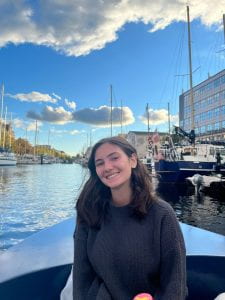
Please provide a brief summary of your research.
Last summer I received a SURG to work in the Gratton Lab on an independent project related to brain networks and Parkinson’s Disease (PD). I used structural and functional MRIs of PD participants and age-matched healthy participants. I ran analyses to find any areas of the brain in which a participant’s brain network organization differed from the group average. Then, I further analyzed this data by determining if these variant regions had any defining structural features, such as occurring in particularly thin areas of the cortex or in a specific anatomical location. Finally, I looked at these results to see if there were any differences between the healthy and PD subject groups.
What made you initially interested in researching your project in particular?
I had been a member of this lab for two quarters and worked on a related project on brain networks. But when I was given the chance to develop my own idea for the SURG, I wanted to tie it back to medicine/diseases somehow because I am a premedical student. That is how I got the idea to look at Parkinson’s Disease.
What made you interested in pursuing (interdisciplinary) research more broadly?
I am a neuroscience major, but my schedule did not allow me to start taking any courses in this field until junior year. I knew research would allow me to start learning about neuroscience earlier and likely give me a unique perspective that I would not get in class.
Describe your experiences with research thus far. Was it tricky? What skills do you think you’ve gained?
Research was scary to start without any experience or background knowledge, but it was very helpful to ask for related research papers and critically read those. I also learned a lot of coding skills with my SURG project.
Any tips or advice you have for students similar to you that are interested in pursuing undergraduate research?
Use the department websites to find labs in the field that you’re interested in and don’t be scared to reach out to professors/labs.
What’s the most interesting thing you’ve learned/read about/listened to this week?
I learned all about Hungarian history while visiting Budapest this week! (I am currently studying abroad in Copenhagen)
Elizabeth V
Elizabeth Vazquez
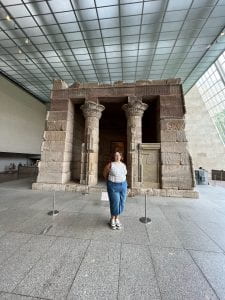
Please provide a brief summary of your research.
My archival research followed a survey of Indigenous Intellectuals in Chicago around the turn of the 20th century, more specifically Simon Pokagon (Pokagon Band Potawatomi) to William Jones (Meskwaki), a linguistic anthropologist. Particularly, I was interested in their entanglements as emblematic of two different generations of Indigenous Intellectuals. I ultimately wanted to ground them in the literal space of the Chicagoland area, so I used old maps in cross reference with their writings to place them in their specific Chicago eras. I read through their main written sources, and ended up focusing more on William Jones to produce a public-facing essay tracing different portrayals of Jones, ranging from his personal letters to a biography written by a friend. Jones is particularly significant because he was the first Indigenous person to receive an anthropology PhD, and worked as a curator in the Field Museum in the early 20th century.
What made you initially interested in researching your project in particular?
I was born and raised in Chicago, so the Field Museum is a place very near to my heart. So many memories were made in my childhood in its winding halls of taxidermy, fossils, and artifacts. However, growing up means learning more, and that ultimately meant learning more about the ways the Field Museum has participated in colonial projects like most American educational institutions. I started with this larger project to grapple more with the Field’s history, and slowly narrowed down to the individual stories within the Field that went against the grain of the time. Now, when I go to the Field, I can make connections across time to people who are part of the Museum’s history.
What made you interested in pursuing (interdisciplinary) research more broadly?
I’m a lover of storytelling, and archival historical research allows for that. I wanted to find people in the archive and become a platform for their stories, hopefully upsetting general assumptions about history. In the case of my research, the idea of an Indigenous man working in a nearly all-white space infamous for creating caricatures of Indigenous people goes against general assumptions of what was happening inside of the Museum. These stories subvert ideas about Indigenous people, such as their only place in Museums as being on display, and refocuses on truth. Even beyond my specific projects, I want to hear these stories, either from oral retellings or by piecing together findings in archives. I want to remember that the names in history at large were people first and foremost before anything else.
Describe your experiences with research thus far. Was it tricky? What skills do you think you’ve gained?
Before my SURG, I did an archival URAP that was more about coding data over large swaths of journals. This however was more my jam. Overall, I loved the experience. I took my time and fell down rabbit holes, and came out with a really cohesive story about someone who not many people know about. The biggest issue I faced during archival research was that one of my subjects, William Jones, had absolutely terrible handwriting. Transcription of cursive is definitely the best skill I’ve gained from last summer.
Any tips or advice you have for students similar to you that are interested in pursuing undergraduate research?
If you have an interest or a passion, talk about it! Ask the faculty you know to find Northwestern’s expert on it. Tell your friends about what you’re thinking (if they’re good friends, they’ll listen). Amazing things can happen when you have these conversations.
Do you have a podcast/documentary/piece of shareable media related to your research?
https://storymaps.arcgis.com/stories/4fb71bd68c524f13ab5a926cbf33f856. This essay is part of a larger project by Professor Kelly Wisecup of the English department.
If you had unlimited time, money, resources, support, etc. what is something you would research?
I’d want to try to learn as much as I can about Hercules, Washington’s enslaved chef who escaped, possibly expanding the project to cover other enslaved chefs of pivotal early American figures.
What is your go-to phrase to yell during the finals “Primal Scream”?
[unintelligible rage noises]
What’s the most interesting thing you’ve learned/read about/listened to this week?
Marscapone, hazelnut, and espresso make for ridiculous cookie add-ins.
What is your most useless talent?
When I unfocus my eyes, I look like a lizard.
Margot
Margot Amouyal
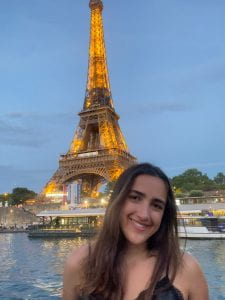
Please provide a brief summary of your research.
My research project explored the rise of emigration from France in the late 20th and early 21st centuries through the creation of a two-part narrative podcast series. The journalistic research project combines over 15 hours of interviews with academic scholars and French citizens to paint a nuanced picture of the economic and educational reasons behind the recent rise in French emigration. Each of the two episodes ranges in length from 30 minutes to an hour and includes background sounds from France, interviews and personal narration. The podcast series is also the culmination of two months of reporting from and living in France.
What made you initially interested in researching your project in particular?
I initially became interested in creating this podcast series due to my family background. I come from a half-French, half-American family and have always been fascinated by both of these cultures. As a result, I wanted to find a way to investigate and document stories that speak to the merger of these two nationalities and the impact globalization had on our political, economical and educational systems. Researching migration became an outlet for me to explore these topics. This is because migration uniquely points to times when cultures mix and individuals are forced to confront their national identities. I then chose podcasting as a medium for research because I wanted to personalize the stories behind the statistics and present my research in an accessible, compelling manner. Secondly, I was interested in gaining more experience with bilingual reporting. I knew this research project would enable me to conduct numerous interviews in French and subsequently translate them, which was proven to be an invaluable experience for me in my development as a news reporter.
What made you interested in pursuing (interdisciplinary) research more broadly?
I have always been fascinated by research and its ability to allow us to understand the world. The grant has uniquely provided me, and many of my classmates, with an opportunity to explore a variety of non-STEM fields. I decided to pursue research in the fields of political science, journalism and economics because those are the fields that particularly pique my curiosity.
Describe your experiences with research thus far. Was it tricky? What skills do you think you’ve gained?
I have loved my research experience thus far. SURG has enabled me to spend two months reporting from France and meet fascinating people in person from a variety of unique places. For example, I spent a weekend in Sarrebourg, a commune in the North of France with a population of around 12,000 people. While there, I met and interviewed Julie Cumin, a farmer and psychology student who moved back to France for ecological reasons after emigrating. Another example is when I visited Station F, the largest startup campus in the world, for a portion of episode one about the startup world in France and how it has incentivized emigration among entrepreneurs. I met Sacha Mourain there, a co-founder and CEO of a Station F-based company. Every interviewee told me something interesting and surprising. These conversations and experiences then enabled me to gain practical skills. For one, it has allowed me to create my first long-form podcast series and tell a concrete, logical and succinct story from many different narratives. Secondly, I was able to learn from my faculty advisor Professor Nettles – a Medill professor and contributor to a variety of exceptional publications, such as New York Times Opinion, Chicago Reader, Chicago PBS station and NPR affiliate WBEZ. Professor Nettles consistently provided feedback and edits that have allowed me to understand the process of a real journalist, such as editing tips and feedback on the scripts. I also learned to report amidst cultural differences. Even though I come from a French family, I still had to learn how to adapt to variations in culture. A huge part of journalism is learning to relate to people who have a different upbringing than you, and this project has taught me how to better approach people in a welcoming way and evaluate the biases I have been taught growing up in the United States.
Any tips or advice you have for students similar to you that are interested in pursuing undergraduate research?
The first piece of advice I would give to students similar to me who are interested in pursuing undergraduate research is to go for it! SURG provides this amazing opportunity to pursue research in a field that interests you. I would then give two additional pieces of advice. For one, I would encourage them to reach out to the URG office and advisors. The URG advisors helped me immensely in drafting my proposal. The writing style of research proposals differs from journalism articles or traditional academic essays, and it can be helpful to learn how to write in this way through URG workshops and or advising. Secondly, I would encourage them to always keep digging. When I drafted the proposal, I had a list of people I said I would speak with; however, I ended up speaking with three times as many people than I planned to as I quickly realized the story is more intricate and nuanced that my proposal could ever outline. I would suggest that every time you conduct an interview ask “who else could I speak with?” Your branch of connections will keep growing if you do this and you will be exposed to stories you never anticipated hearing.
Favorite Breakfast food?
Definitely a good shakshouka with pita bread and tahini sauce. And, of course, a hot coffee on the side!
Jason Roberts
Faculty Feature – Professor Jason Roberts
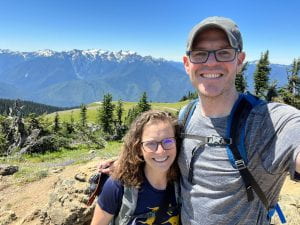
What do you find the most rewarding about working with undergrads?
The chance to share things with them that I love or find fascinating and then hearing their perspectives on those things. No matter how well I think I know a movie or piece of writing, students always see and read in their own distinct ways, and their unique perspectives regularly show me things I hadn’t seen or considered before. I guess that’s kind of a cliche, but it’s at the heart of why I love working with undergrads.
What do you feel helps students have a more productive meeting with you?
I’m always happy when a student comes in with a very specific agenda for a meeting, but I also think Northwestern students should give themselves more permission to be vulnerable and explore. One of the most important things I think I can do for Northwestern students, either in my role at the Office of Fellowships or in the classroom, is to convince them that it’s okay to not know something, especially if that something is their plan for the future. So one version of a productive meeting is to provide students a chance to ask me what I think about any random thing that’s on their mind, or just to provide a sympathetic ear as they think out loud.
What’s the one thing you wish students knew about research?
Here’s another cliche, but it’s a perennial challenge to convince students that research doesn’t only happen in labs. Whatever interests you is also a thing that researchers study. My whole field, film studies, grows out of love for and curiosity about the medium. What do you love? What are you curious about? That’s where research begins, regardless of your answer.
Mackenzie’s Last Post!

I am in a small city near Munich, Germany to take my University entrance exams for the LMU. Because my last post was a call for good travel vibes, I thought it best to end the blog on a good note.

After my 60-hour trip back to Chicago from Melbourne, I reunited with my partner for the first time since June. We flew directly to Arizona, stayed there for a day and a half, then flew to Munich.

From here, I need to pass the second part of the entrance exam in order to matriculate into the University. After that comes apartment hunting and rebuilding my life here in Germany.
Thank you all for reading along these past months. I appreciate your support.
Cheers,
MEG
Please Send Good Travel Vibes
Australia may be the third country in which I stay for longer than intended. My return back to the U.S. is currently estimated about 24-hours later than planned.
If you have good vibes or extra energy to send, please send it my way.
Cheers,
MEG
Melbourne, Australia: Research Summary
The research end of my trip to Melbourne also worked out well. I observed 5 courses, as was standard for the other schools, and I met some amazing students and instructors along the way.
– Like in Kuala Lumpur, a large population of the students at the school in Australia were not citizens of the country. In that sense, the schools who rely on tourism and immigration laws to operate were impacted differently by travel restrictions in the wake of the COVID-19 pandemic.
– If the teachers I observed were not native to Australia, they had lived in Australia for over 10 years. The committment level of ESL instructors and the retention rate was amazing to see, especially in contrast to Peru and Malaysia.
– Discover English offers pronunciation courses, unlike any of the other schools on my list. I enjoyed contrasting the pronunciation course with the other courses on the list.
– Again, I also observed a variety of courses from very basic to advanced. I learned more about how important class discipline is to how the course operates. From my other observations, I thought that beginning courses struggled more with discipline (and they may), but it was enlightening to see more advanced courses struggle with it as well. Note: Discipline is not necessarily an issue of the school or teacher; I also speak very generally about my overall experience in all ESL classrooms for this comment.
Cheers,
Mackenzie
